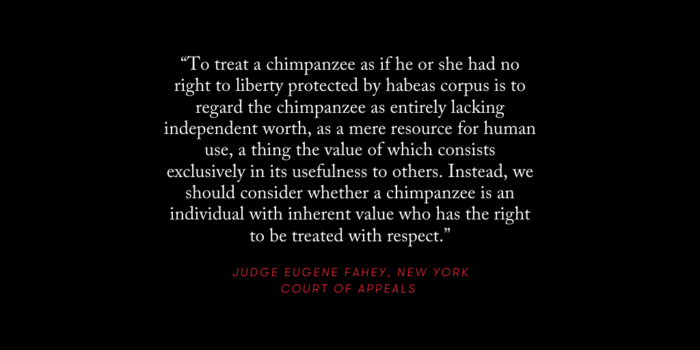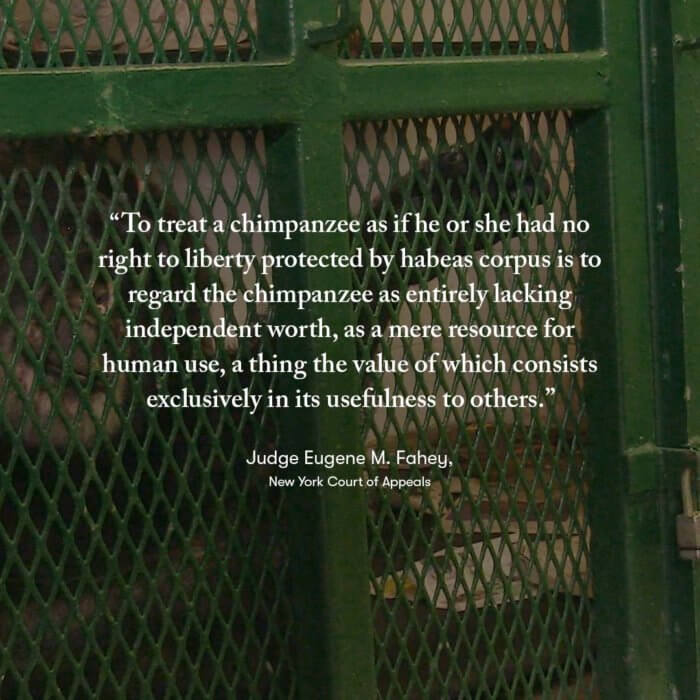In 2015, in response to public concerns about the use of chimpanzees in research and a federal report that suggested “most current biomedical research use of chimpanzees is not necessary” and should be conducted according to much stricter criteria, the National Institutes of Health (NIH) announced it would retire all federally owned and supported chimpanzees from research and relocate them to the federally supported Chimp Haven sanctuary in Keithville, Louisiana. Also in 2015, the U.S. Fish and Wildlife Service finally extended to captive chimpanzees the full spectrum of protections under the Endangered Species Act and restricted their use in experiments to those in which researchers could argue the experiments directly benefited chimpanzees themselves.
Now NIH is reversing course, claiming the 44 chimpanzees who remain in captivity at the NIH-supported Alamogordo Primate Facility are too old or too sick to be released to Chimp Haven. This decision was made by a panel that appears to have included only NIH veterinarians and no independent experts, raising the issue of whether institutional bias might have influenced their decision-making.
The chimpanzees denied sanctuary @ChimpHaven deserve better than "retirement in place" at the research facility that exploited them. We urge @NIH to reevaluate their health status using a panel of independent experts to ensure the chimpanzees' interests truly come first. https://t.co/LEe4L1mU5y
— Nonhuman Rights Project (@NonhumanRights) October 31, 2019
As we expressed in the comments we submitted to NIH in 2018, the practice of continuing to imprison chimpanzees at the same facilities that exploited them, euphemistically referred to as “retirement in place,” is neither sufficient nor just. We fully agree with those in the sanctuary community who maintain that every chimpanzee held in a research facility, unless he or she is on the verge of death, deserves the opportunity to regain his or her autonomy and experience freedom and healing at a true sanctuary.
Absolutely. The @NIH research facilities that have experimented on these chimpanzees have already shortened—and impoverished—the lives of these self-aware, autonomous beings. Sanctuary is the very least of what is owed to them for all that has been taken from and done to them. https://t.co/uwd1DMWdZE
— Nonhuman Rights Project (@NonhumanRights) October 30, 2019
Fortunately, our chimpanzee clients Hercules and Leo, once used in locomotion research in a basement lab at Stony Brook University, are finally free of the research facility that systematically violated their right to bodily liberty—the New Iberia Research Center. They are now living freely at Project Chimps sanctuary thanks in part to the spotlight shined on their plight by our chimpanzee rights litigation.

Nonetheless, US courts and legislatures still view chimpanzees as legal “things” with no rights, which is why, despite some welfare protections that exist, chimpanzees remain highly vulnerable to the interests of institutions like NIH, and many are still imprisoned in the places that have traumatized them. As New York Court of Appeals Judge Eugene Fahey wrote in a historic opinion in Tommy and Kiko’s chimpanzee rights cases, “Instead [of treating a chimpanzee like a “thing”], we should consider whether a chimpanzee is an individual with inherent value who has the right to be treated with respect.”
How you can help:
- Contact the National Institutes of Health (NIH) using the handle @NIH on Twitter to let them know these chimpanzees deserve better than “retirement in place” and urge them to reevaluate the chimpanzees’ health status using a panel of independent experts. You can also call (301-496-4000) or write (9000 Rockville Pike, Bethesda, Maryland 20892).
- Help draw attention to the core issue of chimpanzees’ rightlessness by sharing these graphics along with why you support recognition of chimpanzees’ legal personhood and #nonhumanrights:


Read Judge Fahey’s opinion here, and learn more about Hercules and Leo—the first nonhuman animals in the world to have a habeas corpus hearing to determine the lawfulness of their imprisonment—here.